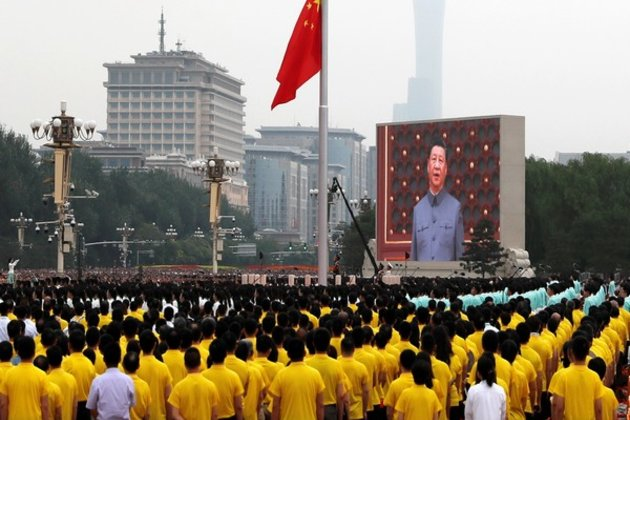Forced Labor is the “Hidden Cost” of China’s BRI

Forced labor is the “hidden cost” of China’s Belt and Road initiatives, says the US State Department’s latest report that ranks the country with the world’s worst human trafficking record.
Chinese citizens employed under some of the Belt and Road projects, as well as nationals of countries hosting the projects, have undergone fraudulent recruitment, resulting in debt slavery, wage withholding, illegal contracts, travel and identity documents seized, says the report on human trafficking released in Washington.
U.S. Secretary of State Blinken cited the example of Zhang Qiang, a Chinese worker, at the launch of the report: Zhang Qiang went to Indonesia last year to work in the “Belt and Road” project, but after his passport was taken away, he was required to sign a contract that was lower than the wages promised to him and worked longer hours. After unsuccessfully appealing to the Chinese Embassy in Indonesia, he smuggled himself into Malaysia, but was arrested by Malaysian authorities, and the latest reports suggest he will be deported back to China.
“All countries should be able to pursue development opportunities without sacrificing respect for human rights,” the report said, “countries that are interested in Belt and Road projects or are currently working on Belt and Road projects must ensure that their citizens, Chinese nationals and other migrant workers are protected from human trafficking.”
“If Belt and Road projects employ local workers, host governments must review recruitment channels and recruitment contracts to ensure that their citizens are not deceived and exploited under false pretense,” the report added.
There are currently nearly 25 million victims of human trafficking worldwide.
While on China, the report noted that the Communist Country had taken some steps to address human trafficking, and said Cinna still has “a policy or pattern of pervasive forced labor,” including continued mass arbitrary detentions of Uighurs and other Muslim minorities in Xinjiang under the pretext of “vocational training” and “de-radicalization,”
Authorities continue to implement these policies in other provinces and use surveillance, harassment, and threats to seek forced repatriation and detention of religious minorities living abroad.
The report also noted that Chinese authorities have failed to adequately monitor recruitment channels, contracts and labor conditions at a time when Chinese nationals are allegedly subjected to forced labor in belt and road projects in some countries, and that China’s diplomatic service has failed to detect these problems and to help those who are exploited.####
- Courtesy VOA
-
Book Shelf
-
 Book Review
DESTINY OF A DYSFUNCTIONAL NUCLEAR STATE
Book Review
DESTINY OF A DYSFUNCTIONAL NUCLEAR STATE
- Book ReviewChina FO Presser Where is the fountainhead of jihad?
- Book ReviewNews Pak Syndrome bedevils Indo-Bangla ties
- Book Review Understanding Vedic Equality….: Book Review
- Book Review Buddhism Made Easy: Book Review
- Book ReviewNews Elegant Summary Of Krishnamurti’s teachings
- Book Review Review: Perspectives: The Timeless Way of Wisdom
- Book ReviewNews Rituals too a world of Rhythm
- Book Review Marx After Marxism
- Book Review John Updike’s Terrorist – a review
-
-
Recent Top Post
-
 Commentaries
Will Japan Join The Five Eyes Spy Network
Commentaries
Will Japan Join The Five Eyes Spy Network
- NewsTop Story Record Pentagon spending bill and America’s hidden nuclear rearmament
-
 NewsTop Story
Taliban Suffers Devastating Blow With Killing Of Minister
NewsTop Story
Taliban Suffers Devastating Blow With Killing Of Minister
-
 China NewsCommentaries
Reality Shadow over Sino-American ties
China NewsCommentaries
Reality Shadow over Sino-American ties
-
 CommentariesNews
Ides of trade between India and Pakistan
CommentariesNews
Ides of trade between India and Pakistan
-
 Commentaries
How sustainable is the rhetoric of India-China Bhai-Bhai
Commentaries
How sustainable is the rhetoric of India-China Bhai-Bhai
-
 Commentaries
New Set of Diplomatic Strains with Canada
Commentaries
New Set of Diplomatic Strains with Canada
-
 News
Ratan Tata’s Legacy
News
Ratan Tata’s Legacy
-
 Commentaries
India’s Strategic Push on the World Stage
Commentaries
India’s Strategic Push on the World Stage
- Commentaries Veils of Resistance
-
AdSense code
















